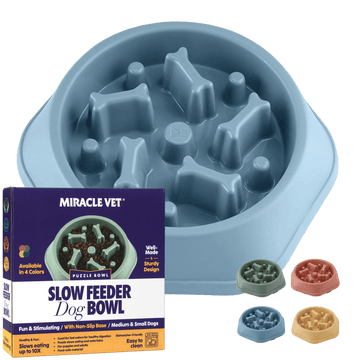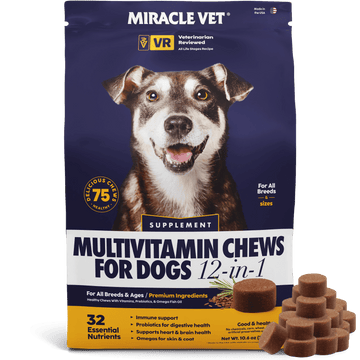
Megaesophagus is a condition where the esophagus becomes enlarged.
This makes it difficult for the dog to swallow. Other animals can have it too, but it is much more common in dogs than cats.
Some breeds are more predisposed to developing an enlarged esophagus, including pugs, shar-pei, German shepherds, Great Danes, dachshunds, and Irish setters.
Siamese cats are more likely to have it than other cat breeds. Megaesophagus can be developed later in life or a dog may be born with it.
If it develops later in life it is typically due to a tumor, ulcer, a foreign object stuck in the throat, heavy metal poisonings such as lead, a parasite in the throat, excessive inflammation, or a number of neuromuscular diseases such as myasthenia gravis or distemper.
If you think your dog may have megaesophagus you should visit your vet for a diagnosis. It is common for a vet to x-ray the dog's neck so they can see if the esophagus is enlarged or not.
Megaesophagus Symptoms
Symptoms and severity of symptoms from Megaesophagus vary from one case to another. One of the most obvious symptoms is they will have trouble keeping food or even water down and will vomit soon after most meals.
This leads to unhealthy and possibly dangerous weight loss. Because the dog suffering from megaesophagus will not be able to swallow they will also drool excessively and have halitosis (bad breath). Other symptoms include the following:
Nasal Discharge
Lack of appetite
Excessive hunger
Loud, labored breathing including coughing
Depression
If the dog is a puppy and still growing, they may also experience stunted growth and slow development.
Depression seems like it may not belong on this list but an unhealthy body can lead to an unhealthy mind.
When a dog (or anyone, really) is not feeling their best and is physically weak depression can set in and make life worse.
Treatment and management
Depending on if a dog is born with megaesophagus, there may or may not be a cure. If a dog was born with it, it is most likely incurable.
A dog who developed it later in life different treatment options are available and it may be possible to completely heal.
For example, if it is being caused by a foreign object stuck in the throat, the vet will remove it to provide immediate relief.
Antibiotics may be helpful if the cause in an infection and antacids and other medication such as gastroprotectants which help reduce the amount of acid if the cause is an ulcer or ulcers.
In these cases it will often take time for the swelling to go down and the dog to return to normal. Before they are healed you will need to follow the feeding steps listed below.
Due to the breathing issues that can arise from megaesophagus it, may be necessary to give the dog oxygen.
There are several types of oxygen therapy including leaving your dog in a sealed crate with a higher than normal oxygen level for them to sleep in, or more simply, an oxygen mask or oxygen catheter.
Oxygen therapies can be quite stressful for the dog and some older or weaker dogs may not be able to use it due to the added stress levels.
As always, you will want to consult with your vet before taking any steps with treatment or management.
It is possible to misdiagnose, especially with a home diagnosis. This is something you definitely want an expert opinion on to make sure you are doing what’s best for your furry friend.
Feeding instructions
For a dog born with megaesophagus, sometimes the best bet is symptom management.
Due to one of the most common issues being holding down food and weight loss, you will have to make sure they are getting all the nutrients they need.
Vets typically recommend using a blender or just adding water/using a wet food and whipping it until it is in an almost gruel like state. This is much easier for a dog to swallow than the average dry food alone.
One of the more challenging aspects of feeding is that your pet must eat in an upright position to get food passed through its esophagus.
You can try to hold them on your lap in a sitting position and hand feed them or get them a special chair designed for them to sit in while eating.
Bailey Chairs for Dogs makes a great product that can help your dog live a normal as can be expected life and is easy to use. You can find their high quality, life-saving products here
https://www.baileychairs4dogs.com/
Feeding your dog smaller meals more frequently helps as well. Instead of the regular 2 meals a day, 4-5 meals per day is more common.
The dog must also stay in the upright position for a minimum of 10-15 minutes after eating to help prevent vomiting.
Excessive vomiting also causes dehydration. You will need to make sure your dog is drinking plenty of water.
One way this can be done is by adding even more water than what is needed to their food when blending it.
Due to the weight loss, adding in an easily digestible supplement such as Miracle Vet liquid weight gainer will help add calories to your dog's diet and keep their weight up at a healthy level.
Outlook
Unfortunately, even with all the above steps taken, the outlook is not always good for dogs or cats with megaesophagus.
While they may be able to live a long and healthy life there are many complications that come with the condition.
Pneumonia, anemia, kidney and liver issues are all common not only as a direct result, but also from being dangerously underweight.
If it is so bad the animal is having trouble breathing they will not be able to be as active which can lead to a whole host of issues throughout their body. That is why it is important to make sure your best friend is getting all their nutrients and keeping them down.
Regular checkups with your vet will become even more important to keep an eye on any other complications that may arise alongside megaesophagus. A nutrient dense food with added supplementation being fed to a dog properly is one of the best ways to avoid further trouble down the road.








